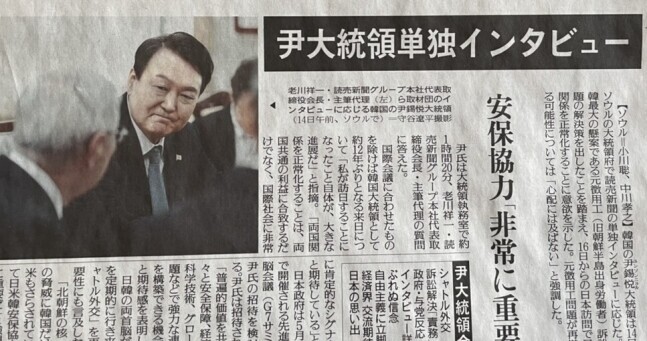hankyoreh
Links to other country sites 다른 나라 사이트 링크
Yoon reassures Japan that forced labor deal won't be reversed down the line

In an interview with a Japanese newspaper, South Korean President Yoon Suk-yeol said that there are “contradictions” between the Supreme Court’s 2018 ruling that ordered Japanese perpetrator companies to pay damages to the victims of forced labor during the Japanese colonial period and a 1965 agreement in which Korea and Japan agreed to settled outstanding claims. Yoon added that finding a harmonious solution is “the duty of political leaders.”
His remarks appear to be an attempt to placate Japan by rejecting the South Korean Supreme Court’s finding that the individual right to claim damages was not exhausted by the Korea-Japan claims agreement signed decades earlier.
Yoon made the comments in an interview with Japanese newspaper the Yomiuri Shimbun that was printed on Wednesday.
“In regard to the forced labor issue, the 1965 agreement was the culmination of negotiations between Korea and Japan that date back to the 1950s. We also have the normative interpretation of the 1965 agreement, the history of the two governments’ interpretation of the agreement and the Supreme Court’s ruling in 2018,” Yoon said.
“Harmonizing any contradictions or inconsistencies that may appear in those various documents is, in my opinion, the role of the government and the duty of political leaders,” he said.
Yoon said that the Korean government’s plan for third-party repayment by the publicly run Foundation for Victims of Forced Mobilization by Imperial Japan is something that he “thought would be reasonable since before running for president.”
“I think the controversy will die down once compensation has been made,” he said.
“This isn’t the sort of solution that will lead to exercise of right to recourse down the road. That’s something there needn’t be worries about,” Yoon said, responding to concerns inside Japan that the Yoon administration’s forced labor solution could be reversed when another party comes to power later on.
“He was saying that nothing of that kind [claims for compensation] will happen under the Yoon administration,” an official with the presidential office explained.
In the same interview, Yoon addressed Japan’s decision in December 2022 to acquire enemy base strike capability, also called counterstrike capability, referring to the ability to directly strike missile bases in nearby countries such as North Korea or China. “I fully understand the measures Japan is taking at a time when North Korean intermediate-range missiles are passing across the Japanese islands,” he said.
Yoon’s comments are in line with Japanese arguments aimed at scrapping the principle of “exclusively defensive defense,” which says that military measures can only be used in response to an attack.
Yoon’s interview in the Yomiuri Shimbun’s Wednesday paper was printed one day before his summit with the Japanese prime minister.
“Looking at Korea-Japan relations thus far, the very fact that I’m visiting Japan is major progress and a big accomplishment [in bilateral relations]. I expect that normalizing our bilateral relations will not only serve our two countries’ shared interests but will also be taken as a very positive signal by the international community,” he stressed.
“Normalizing our two countries’ deteriorated relationship is something I promised the Korean people I would do during the presidential election,” Yoon added.
“We cannot afford to waste time while leaving strained Korea-Japan relations unattended,” Yoon said in a written interview Wednesday with international media, including Reuters and Kyodo News, without making any tangible demands of Japan.
“[Yoon] is basically saying that the [forced labor] victims will be deprived of the judicial rights afforded by their legal victory. That degrades both justice in the Korean judicial branch and order and legitimacy in the executive branch,” said Yuji Hosaka, a professor at Sejong University.
By Bae Ji-hyun, staff reporter; Shin Hyeong-cheol, staff reporter
Please direct questions or comments to [english@hani.co.kr]

Editorial・opinion
![[Column] Will Seoul’s ties with Moscow really recover on their own? [Column] Will Seoul’s ties with Moscow really recover on their own?](https://flexible.img.hani.co.kr/flexible/normal/500/300/imgdb/original/2024/0513/5917155871573919.jpg) [Column] Will Seoul’s ties with Moscow really recover on their own?
[Column] Will Seoul’s ties with Moscow really recover on their own?![[Column] Samsung’s ‘lost decade’ and Lee Jae-yong’s mismatched chopsticks [Column] Samsung’s ‘lost decade’ and Lee Jae-yong’s mismatched chopsticks](https://flexible.img.hani.co.kr/flexible/normal/500/300/imgdb/original/2024/0512/3017154788490114.jpg) [Column] Samsung’s ‘lost decade’ and Lee Jae-yong’s mismatched chopsticks
[Column] Samsung’s ‘lost decade’ and Lee Jae-yong’s mismatched chopsticks- [Correspondent’s column] The real reason the US is worried about Chinese ‘overcapacity’
- [Editorial] Yoon’s gesture at communication only highlights his reluctance to change
- [Editorial] Perilous stakes of Trump’s rhetoric around US troop pullout from Korea
- [Guest essay] Preventing Korean Peninsula from becoming front line of new cold war
- [Column] The state is back — but is it in business?
- [Column] Life on our Trisolaris
- [Editorial] Penalties for airing allegations against Korea’s first lady endanger free press
- [Editorial] Yoon must halt procurement of SM-3 interceptor missiles
Most viewed articles
- 1Seoul’s plan to adopt SM-3 missiles is like wanting a sledgehammer to catch a fly
- 2[Column] Samsung’s ‘lost decade’ and Lee Jae-yong’s mismatched chopsticks
- 3[Correspondent’s column] The real reason the US is worried about Chinese ‘overcapacity’
- 4Korea poised to overtake Taiwan as world’s No. 2 chip producer by 2032
- 560% of young Koreans see no need to have kids after marriage
- 6[Editorial] Yoon’s gesture at communication only highlights his reluctance to change
- 7Yoon voices ‘trust’ in Japanese counterpart, says alliance with US won’t change
- 8Yoon rejects calls for special counsel probes into Marine’s death, first lady in long-awaited presse
- 9S.K.-Japan joint history project to be revived
- 10Former President Roh Tae-woo, mastermind of 1979 military coup, dies at 88